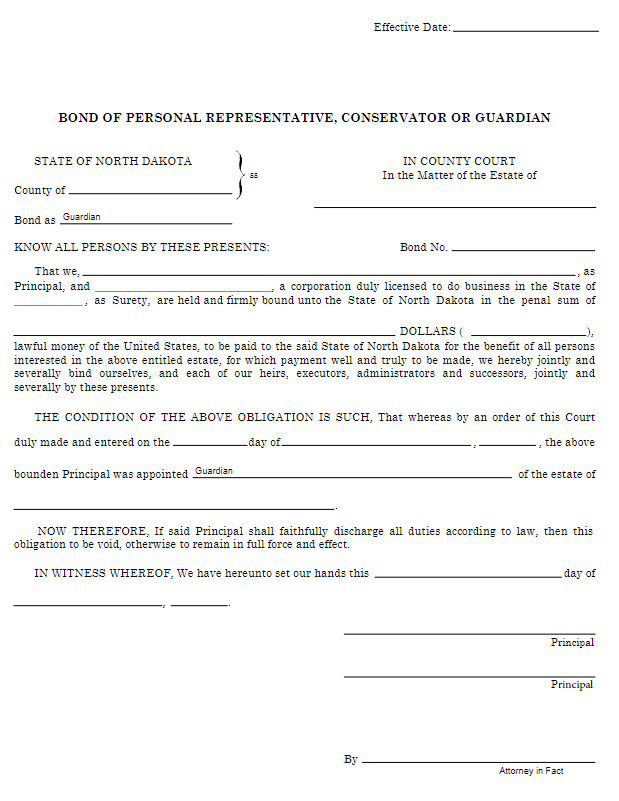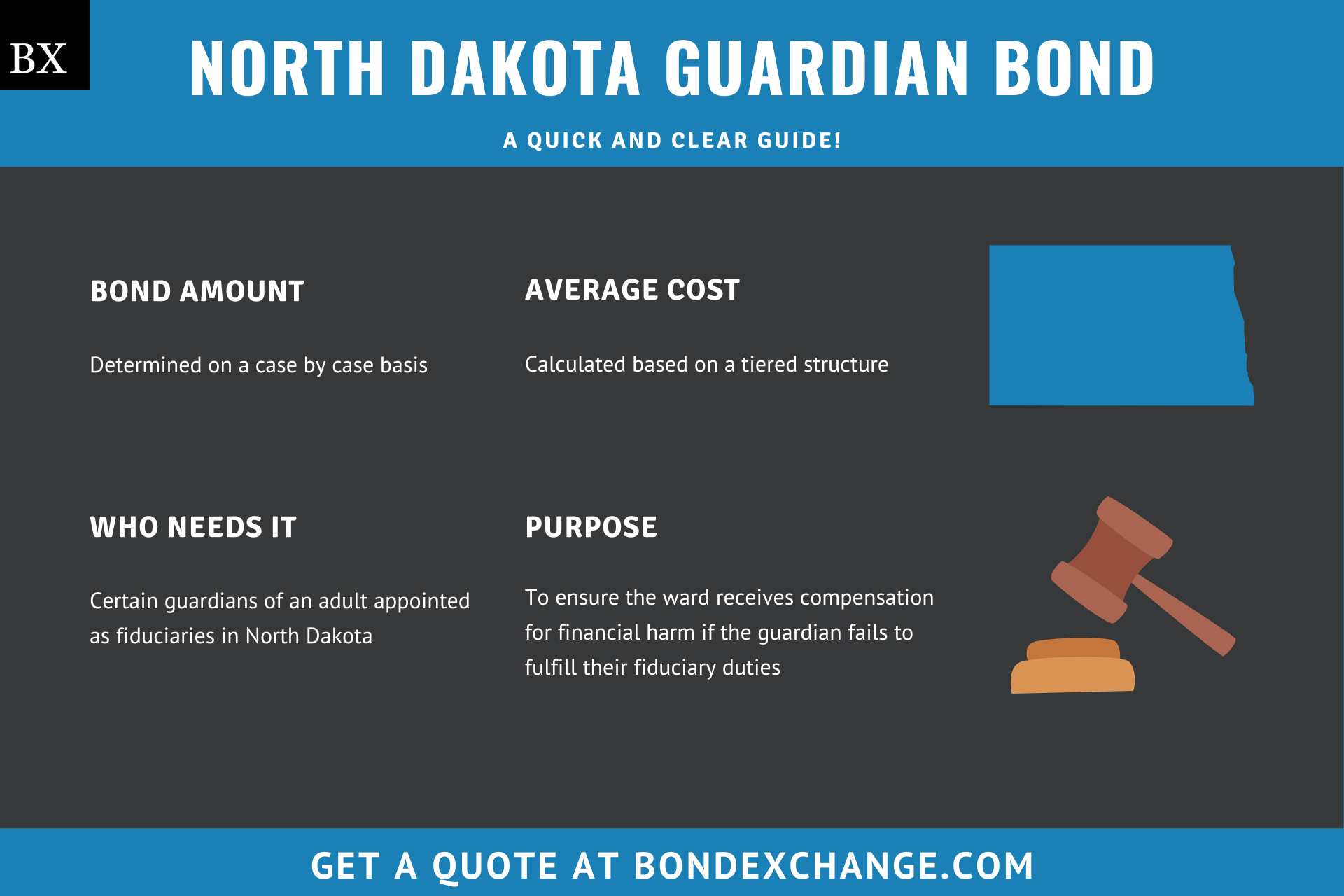North Dakota Guardian Bond: A Comprehensive Guide
This guide provides information for insurance agents to help their customers obtain a North Dakota Guardian bond.
At a Glance:
- Average Cost: Calculated based on a tiered structure
- Bond Amount: Determined on a case-by-case basis
- Who Needs It: Certain guardians of an adult appointed as fiduciaries in North Dakota
- Purpose: To ensure the ward receives compensation for financial harm if the guardian fails to fulfill their fiduciary duties
- Who Regulates Guardian Bonds in North Dakota: The district court in the county where the ward resides or has property

Background
North Dakota Code 30.1-28-03 requires all guardians to be appointed by a court before assuming their fiduciary duties. The North Dakota legislature enacted the appointment requirement to ensure guardians act in the ward’s best interests when making decisions related to their health and welfare. To provide financial security for the enforcement of this requirement, certain guardians must purchase and maintain a probate surety bond before becoming appointed as a fiduciary.
What is the Purpose of the North Dakota Guardian Bond?
North Dakota requires certain guardians of an adult to purchase a surety bond as a prerequisite to being appointed as a fiduciary. The bond ensures that the ward will receive compensation for financial harm if the guardian fails to abide by the regulations outlined in North Dakota Code 30.1-28-04. Specifically, the bond protects the ward if the guardian fails to adhere to all court orders or mishandles the ward’s assets.
For example, if a guardian uses money from the ward’s bank account to pay for unauthorized expenses or mixes the estate’s funds with their own, the ward can file a claim against the guardian’s bond to recoup their losses. In short, the bond is a type of insurance that protects the ward if the guardian does not fulfill their fiduciary duties.
How Can an Insurance Agent Obtain a North Dakota Guardian Bond?
BondExchange makes obtaining a North Dakota Guardian bond easy. Simply log-in to your account and use our keyword search to find the “Guardian” bond in our database. Don’t have a login? Gain access now and let us help you satisfy your customers’ needs. Our friendly underwriting staff is available by phone (800) 438-1162, email or chat from 7:30 AM to 7:00 PM EST to assist you.
At BondExchange, our 40 years of experience, leading technology, and access to markets ensures that we have the knowledge and resources to provide your clients with fast and friendly service whether obtaining quotes or issuing bonds.
Not an agent? Then let us pair you with one!

Click the above image to find a BX Agent near you
What are the Underwriting Requirements for the North Dakota Guardian Bond?
Most surety companies will examine the following factors when determining eligibility for the North Dakota Guardian bond:
- Guardian’s credit history
- Whether or not the estate has an attorney
- Whether or not the guardian is a family member
- The guardian’s occupation
- Whether or not the guardian is replacing a prior fiduciary
- If the guardian has ever committed a felony
- Whether or not there is any ongoing business in the estate
- If a creditor is requiring the bond
- If the bond amount is greater than or equal to the estate’s value
How Much Does the North Dakota Guardian Bond Cost?
Surety companies typically determine the premium rate for Guardian bonds based on a tiered structure, so larger bond amounts will be charged a lower premium rate than smaller bonds.
The following table illustrates the pricing structure for the North Dakota Guardian bond:
$1,500,000 Guardian Bond Cost
| Bond Amount | Premium Rate | Total Bond Cost |
|---|---|---|
| First $20,000 | 0.75% | $150 |
| Next $40,000 | 0.60% | $240 |
| Next $140,000 | 0.50% | $700 |
| Next $300,000 | 0.375% | $1,125 |
| Next $1,000,000 | 0.25% | $2,500 |
| Total cost of $4,715 |
Who is Required to Purchase the Bond?
North Dakota requires certain guardians to purchase a surety bond as a prerequisite to becoming a court-appointed fiduciary. To paraphrase North Dakota Code 30.1-01-06 and 30.1-26-01, a “guardian” is an individual appointed as a fiduciary responsible for providing care and protection to a ward. Likewise, a “ward” is defined as a minor or incapacitated adult for whom a guardian has been appointed that is incapable of making sound decisions concerning their health and welfare.
The court has the authority to require a surety bond for guardians under good cause and will determine if a bond is necessary along with the required bond amount on a case-by-case basis. Guardians of a minor child are not required to obtain a bond.

How do North Dakota Guardians Become Appointed as Fiduciaries?
Guardians in North Dakota must navigate several steps to become appointed as fiduciaries. Below are the general guidelines for guardians of adults only, as each guardianship case for minors comes with its own unique appointment process and must be addressed individually. Appointees should refer to the appointment statutes or the North Dakota Courts’ website for details on the process.
Step 1 – Hire an Attorney
Although not explicitly required, it is highly recommended that guardians hire an attorney to assist with the guardianship process.
Step 2 – Determine Priority
Priority to serve as a guardian is granted in the following order:
-
- The ward’s nominee made under their most recent power of attorney if the ward has sufficient mental capacity and made the nomination prior to being determined as incapacitated
- The spouse of the ward or their nominee
- The adult child of the ward or their nominee
- A parent of the ward or their nominee
- A relative of the ward who has resided with him or her for at least 6 months before the petition is filed
- Any relative or friend who has maintained significant contact with the ward or a person from a volunteer agency
- A nonprofit corporation established to provide guardianship services
- Any appropriate government agency, including human service zones
- The nominee of a person or corporation nominated by an entity caring for or paying benefits to the ward
The court will appoint the guardian best suited for the proposed ward and may choose to appoint a person with lower priority or without priority. An owner, operator, or employee of a long-term care facility that provides care to the proposed ward is ineligible for appointment unless there is no other person to serve as guardian and the employee does not provide direct care to the proposed ward.
Step 3 – Submit an Application
Before petitioning the court for guardianship, persons seeking guardianship must submit an application to the Guardianship Establishment Program at the following address:
Guardianship Establishment Fund
Aging and Adult Services
1237 W. Divide Ave, Suite 6
Bismarck, ND 58501
The program is operated by the Department of Human Services and provides assistance to people who are petitioning for guardianship. The application must be submitted to the Department of Health Services, not the court handling the guardianship case.
Step 4 – Complete the Training
North Dakota requires persons seeking guardianship to complete a training course as a prerequisite to being appointed as a fiduciary. The training course can be completed at any time during the process, however, the court will not finalize the appointment until the person meets the requirement. Once the course is complete, an affidavit of completion must be submitted to the court.
Step 5 – File all Required Forms
Persons seeking guardianship over a minor must file multiple forms with the district court with jurisdiction over where the ward resides or has property. Petitioners can obtain the forms online here or from the court, and must also complete a criminal history check with the North Dakota Attorney General. Petitioners can find instructions on filing the forms online here.
Step 6 – Notify the Appropriate Parties
After submitting the required items to the court, petitioners must have another adult, also known as a server, notify all interested parties as directed by the court. The notice must include a notice of the hearing and a copy of the petition, and petitioners can obtain more information on how to provide notice here. Once complete, petitioners must file a proof of service with the clerk of the district court. If proof of service isn’t filed, the judge or judicial referee may cancel the hearing.
Step 7 – Attend a Hearing
Guardians must attend a hearing conducted by the court and present evidence as to why the incapacitated adult is in need of guardianship. The court will examine the evidence presented by the guardian as well as that presented by the individual being evaluated (if any) and make a determination as to whether or not guardianship is necessary.
Any interested person can apply to the court to participate in the hearing. If the court finds a basis for the appointment, it will issue a letter of guardianship to the petitioner.
Step 8 – Purchase a Surety Bond
The court, in its sole discretion, may require guardians of an adult to purchase and maintain a surety bond.
How do North Dakota Guardians File Their Bonds?
Guardians should file their completed bond forms, including the power of attorney, to the clerk of the district court of the county where the ward resides or owns property.
The surety bond requires signatures from the surety company that issues the bond, the applicant, and a notary public. The surety company should include the following information on the bond form:
- Legal name of the entity/individual(s) buying the bond
- Surety company’s legal name and state of incorporation
- Legal name and county of the ward
- Bond amount
- Type of fiduciary relationship
- Date the bond is signed and goes into effect
- Date the guardian was appointed
What can North Dakota Guardians do to Avoid Claims Made Against Their Bonds?
To avoid claims against their bonds, guardians in North Dakota must ensure that they:
- Perform all of their fiduciary duties
- Obey all court orders
- Do not mishandle the ward’s property
